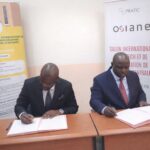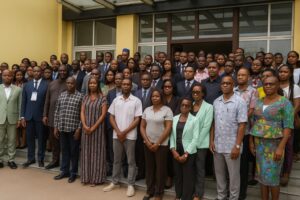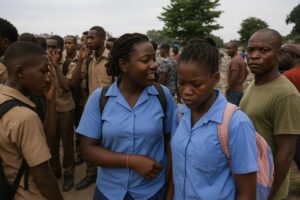Oil Revenue Meets Academic Ambition
The recent allocation of more than 160 million FCFA to the Denis Sassou Nguesso University by Hemla E&P Congo drew appreciative applause in the lecture halls of Kintélé and discreet nods in diplomatic circles. Observers view the grant as a calculated intersection of economic pragmatism and soft-power projection, an approach that echoes regional precedents in Luanda and Abuja where resource companies have anchored reputational capital in academic institutions. In Brazzaville, the move reinforces the administration’s communiqué that the energy sector can act as a locomotive for knowledge-based diversification.
- Oil Revenue Meets Academic Ambition
- Laboratories Poised for a Technological Leap
- Alignment with Governmental Development Doctrine
- Corporate Social Responsibility in the Petro-State Context
- Regional Precedents and Geopolitical Subtext
- Calls for a Broader Coalition of Donors
- Measuring Impact Beyond the Monetary Figure
- Strategic Implications for Congo-Brazzaville’s Diplomacy
- A Forward-Looking Epilogue
Laboratories Poised for a Technological Leap
According to Professor Ange Antoine Abena, the university’s president, the financing will equip the Faculty of Applied Sciences with digital microscopes and furnish the Institute of Geographic, Environmental and Planning Sciences with advanced material-testing machinery. Such investments, he argued during a media briefing, will “transform totally the pedagogical architecture” of the institution. Academic staff share this optimism, noting that the current reliance on dated optical devices has limited precision in geology, agronomy and biomedical courses, fields directly tied to Congo’s resource and health strategies.
Alignment with Governmental Development Doctrine
The donation dovetails neatly with the National Development Plan 2022-2026 that places human capital formation at the heart of diversification. Officials at the Ministry of Higher Education emphasise that improved laboratory capacity should not be read merely as campus modernisation but as an instrument for enhancing national research outputs for climate resilience, petroleum engineering and spatial planning. Their assertion finds resonance in recent African Union communiqués urging member states to commit at least one per cent of GDP to research and development, a benchmark Congo-Brazzaville is gradually approaching.
Corporate Social Responsibility in the Petro-State Context
In public remarks, the administrator of Hemla E&P Congo underscored that “education is one of the fundamental pillars of development” and insisted that the gesture is an authentic contribution to the Republic’s future rather than a public-relations exercise. Analysts acknowledge that corporate social responsibility programmes in hydrocarbon-rich states often seek to pre-empt criticism over environmental footprints. Yet they also observe that well-targeted educational grants can create tangible downstream benefits, including an indigenous cohort of engineers and geoscientists who lower expatriate labour costs.
Regional Precedents and Geopolitical Subtext
The Congolese initiative parallels similar partnerships between universities and extractive firms from Ghana to Mozambique. In those cases, universities reported measurable increases in peer-reviewed publications and patent filings within five years of receiving laboratory upgrades. Diplomats stationed in Brazzaville interpret Hemla’s move as a signal to other foreign concessions that the Republic values not only fiscal compliance but also social-development co-authorship. Such signalling may become increasingly salient as Brazzaville seeks to balance existing alliances with new suitors from Asia and the Middle East eager for offshore acreage.
Calls for a Broader Coalition of Donors
From the parliamentary benches, several deputies have already urged additional oil operators to emulate Hemla’s example, a sentiment echoed by the Rectorate which envisions a consortium model of support. Early conversations reportedly involve downstream service providers interested in endowing chairs in corrosion science and pipeline digitalisation, disciplines integral to the African Continental Free Trade Area’s prospective energy corridors.
Measuring Impact Beyond the Monetary Figure
Economists caution that the ultimate metric of success will be student outcomes rather than the headline figure of 160 million FCFA. In a continent where graduate unemployment averages thirty per cent, efficiency of capital use and curricular alignment with labour markets remain paramount. Nonetheless, preliminary indicators are promising: enrolment inquiries in applied physics and geomatics rose by nineteen per cent in the fortnight following the announcement, suggesting an immediate reputational boost for the university.
Strategic Implications for Congo-Brazzaville’s Diplomacy
For Brazzaville’s foreign partners, the episode offers a concise demonstration of the Republic’s intention to translate commodity wealth into knowledge infrastructure. By encouraging resource companies to underwrite scientific capacity, the government subtly repositions itself from mere exporter of crude to orchestrator of regional intellectual assets. Such positioning could carry weight in multilateral negotiations over climate finance and technology transfer, where demonstrable domestic research capability often influences allocation decisions.
A Forward-Looking Epilogue
While the microscopes and testing rigs have yet to clear customs, their symbolic freight is already being parsed in think-tank briefings from Addis Ababa to Brussels. If the equipment arrives on schedule and faculty training proceeds apace, Denis Sassou Nguesso University may soon stand as a case study in how targeted corporate philanthropy, harmonised with state planning, can magnify diplomatic gravitas. The challenge, as several professors concede, will be to ensure that the gleaming instruments do not merely decorate laboratories but illuminate pathways to sustainable, home-grown innovation.





















